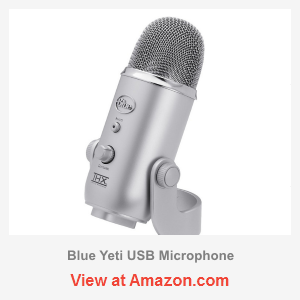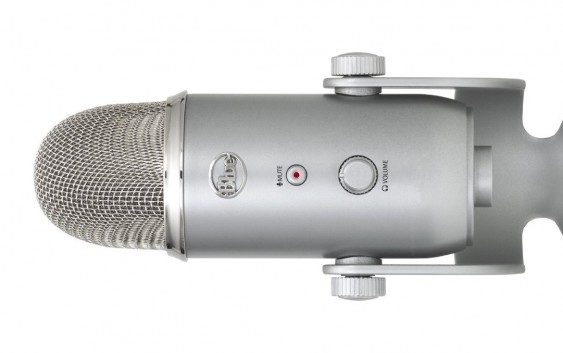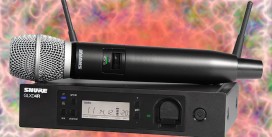When it comes to quality, Blue Yeti would be undoubtedly one of the first choices among any other USB microphones. The truth is, nowadays USB mics are being stamped by all and sundry manufacturers. Logitech would be an excellent example. Specializing in computer accessories, they produce great keyboards and mice, and even sound systems but when it comes to standalone mics, they simply don’t have enough expertise. The best what they can do is some fancy-looking devices, mainly oriented for gaming use and web-conferencing. For such needs, although a bit overpriced, they may indeed perform great, but that’s about it.
Blue Microphones, on the other hand, is the company that specializes on professional, quality mics. Blue Yeti is also such mic. Good build, quality made and an excellent sound pattern, with the only difference is that it’s being connected through USB unlike most high-end recording devices. For those who never held professional mics before, without exaggerating, this will be a sensation. The good news is it also has a very moderate price tag, comparable to more like computer accessories rather than a professional studio-recording device. The best price for the quality is what we believe makes Blue Yeti such a terrible rival.
Functionality and design
If you never had a studio mic before, this device may seem a bit large, and yet its dimensions are kind of fair: 4.7 x 4.9 x 11.6 inches for width, depth and height respectively. That’s including the stand. Contrary to what most users expect when they look at the pictures, Blue Yeti is made of a solid metal and has a very firm build overall. On the other hand, the control buttons have somewhat flimsy feel and should be used with caution. Looks like these buttons are the only things that can actually break or wear out, so in order to prolong the life of your device we advise to use them only when necessary.
Now it’s time to tell about its capabilities. Blue Yeti has two ports. The first one is of course USB that powers the device and sends the digital signal to computer. This model has a standard sampling rate of 16 bit at 48 kHz. The USB cable of around 6 feet long is also included in the package. The other output port is a 3.5 mm headphones jack, allowing you to hear exactly what’s being captured. Both ports along with a shock mount thread are located underneath the device; however, the shock mount itself is not included in the package and we’ll get to that later.
At the face side, it has a mute button and a volume control. At the back, there is another control for gain and a four-position pattern switch. You may choose between cardioid, bidirectional, omnidirectional & stereo picking patterns. This is achieved by combining three condenser capsules, whose signals are processed in different ways. Considering that the vast majority of traditional microphones use only single capsule, Blue Yeti will and does sound different. This can be especially noticeable in the cardioid mode; however, it’s not a necessarily bad thing!
Sound & quality
 Blue Yeti sounds surprisingly rich for its cost. It is a sensitive mic so be prepared that it will be picking up both wanted and unwanted sounds alike. However, a proper positioning along with right picking pattern can help to achieve a good level of noise cancellation. For instance, if the source of noise is behind the mic, you may use a cardioid pattern; if the noise is coming from sides, a bidirectional pattern will be handy. This is where its functionality turns out very useful. If you play an acoustic guitar, you’ll especially like the stereo mode, which can make it sound much more natural.
Blue Yeti sounds surprisingly rich for its cost. It is a sensitive mic so be prepared that it will be picking up both wanted and unwanted sounds alike. However, a proper positioning along with right picking pattern can help to achieve a good level of noise cancellation. For instance, if the source of noise is behind the mic, you may use a cardioid pattern; if the noise is coming from sides, a bidirectional pattern will be handy. This is where its functionality turns out very useful. If you play an acoustic guitar, you’ll especially like the stereo mode, which can make it sound much more natural.
The main advantage Blue Yeti boasts over its competitors is the THX certification. In fact, it was the first microphone that actually earned it. THX warrants for sound quality and guarantees the whole frequency range is delivered just the way it should – and this is indeed so. On the other hand, many other mics will often deviate from the natural pattern, coloring some frequencies and muting the others. Depending to the pitch of your voice or whatever you record those individual peculiarities can be both destructive and beneficial; however, any deviation greatly narrows the purpose of such device and more than often works as a disadvantage.
Although THX certification makes it hard to complain about Blue Yeti’s sound precision, this mic is still not devoid of some shortcomings. Condenser mics are generally capricious when it comes to environment noise, and even though this model offers a great deal of cancellation, for some uses this may not be enough. The thing is vibrations will also travel through the microphone stand, which you’ll hear, for example, if you place your mic at the table and try to do some typing. In order to eliminate such noises, people would usually use a shock mount. Yet, much to the surprise of the users, Blue Yeti has non-standard dimensions, thus many available shock mounts simply won’t fit.
Advantages, uses and application
To sum it all up, let us draw the line and say who and why should consider getting this particular microphone. Blue Yeti is made to handle things like podcasting & voiceovers, working great for any conference calls, and of course singing and playing instruments. You’ll get all that with near professional quality and simplest possible setup. Unlike other studio mics, you won’t need any special equipment like preamplifiers, etc. That makes it very easy to use with any computer or even laptop, as all you have to do is just plug it on and you’re ready to go.
Direct headphone output is also a very useful feature. It is still possible to hear yourself without it; that is by mapping the microphone through your PC back to your headphones or speakers, but that method is highly impractical. This seemingly unimportant feature will help you save from buying another piece of equipment that does exactly that. Then again, if you’ll use the pattern switch often, this will save you from buying three different mics. Overall, Blue Yeti would be both a great choice for any practicing singer and a perfect all-in-one budget solution for a home studio.
Pros
|
Cons
|










Although Mic is good quality for the price, service department is ineffective and gives the same cut/paste response each time. USB port failed while under warranty and simply asked for a vendor or process to fix the mic. Slow response for customer service and ineffective responses to emails. Finally found a vendor myself to have the port fixed.
You are more likely to spot a real Yeti than get customer support from Blue Microphones. For lack of a better way to say, they really were abominable and dragged things out for weeks. Avoid this product not because it is poorly designed but because you are literally on your own should anything happen to your mic. Mine died after two days and it was a nightmare to deal with them.
I agree, terrible after-sales service and very flimsy components.
Don’t waste your money, get a Rode mic.